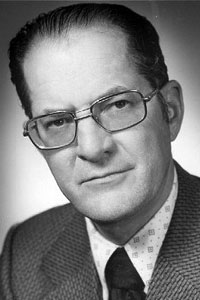Reg Forbes was born at Rorketon, Manitoba in 1924 and was raised in the Dauphin area. He joined the RCAF in 1943 and trained as a navigator. Following his discharge in 1945, he attended the Faculty of Agriculture at the University of Manitoba and graduated in 1949.
He joined the Manitoba Department of Agriculture in 1949 and served as the agricultural representative at Pilot Mound. During his time there, he initiated the “Save the Soil” campaign, which became a province wide conservation program. In 1956, he was appointed principal of the Agriculture and Homemaking School in Brandon and agricultural representative. Under his guidance, the school was changed to the Agricultural Extension Centre, which has served as a forum for discussion of all nature of rural concerns.
Heavily involved in many aspects of rural circumstances, he was instrumental in affecting the amalgamation of the Manitoba Winter Fair and the Provincial Exhibition, the outgrowth of which led to the construction of the Keystone Centre. He served as president of the Royal Manitoba Winter Fair, the Provincial Exhibition and as chairman of the Keystone board of directors.
In his capacity as agricultural representative, he was successful in the development of the Farmers Co-op seed cleaning plant at Rivers and is credited with bringing Ayerst Organics to Brandon and the PMU industry to the region. He served as a commissioner with the Hall Commission on Grain Handling and Transportation. His empathy and understanding of rural life and people was a positive contribution to the credibility of the report.
Other organizations in which Forbes was involved included the Westman Regional Development Corporation, Brandon Chamber of Commerce, Wheat Belt Community Futures, Venture Corporation, the Brandon Economic Development Board and as founding member of the Commonwealth Air Training Plan Museum.
On the professional side of agriculture, he was involved as the president of the Manitoba Institute of Agrologists, the Canadian Society of Rural Extension and the Agricultural Institute of Canada. He was awarded the highest honour of his profession when he was named a Fellow of the A.I.C.
Throughout his career, his strongest virtue has been in the field of communications, explaining and making people aware of the interdependence of agriculture and other segments of the community.
He is well known for his abilities, his positive attitude and his deep concern for agriculture and the people of the industry.


